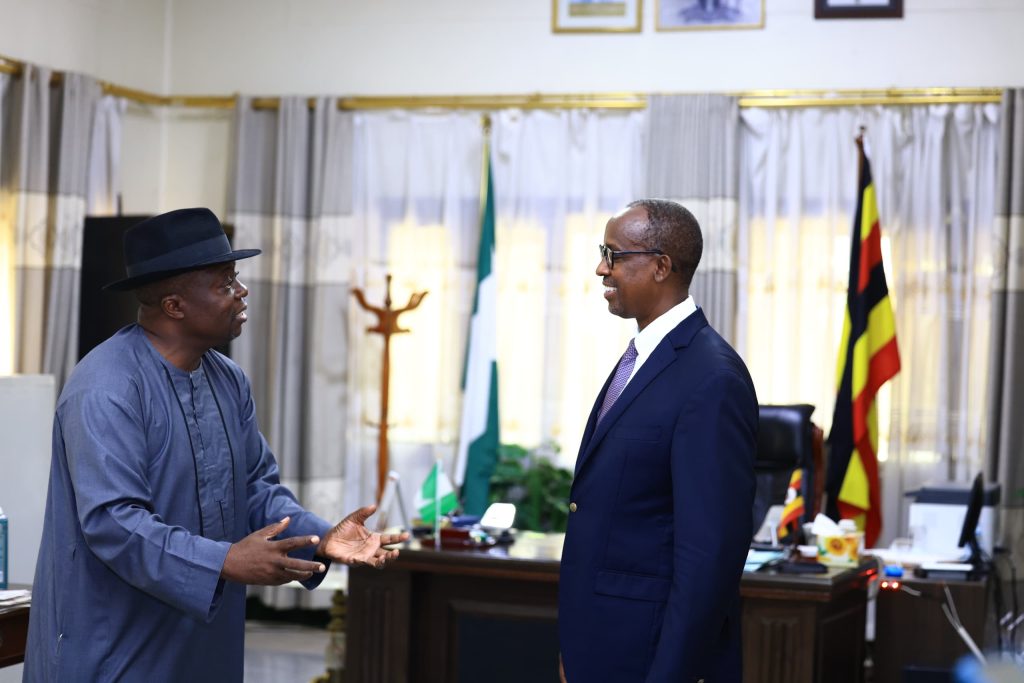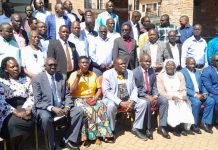The Chairman of Uganda’s Presidential Advisory Committee on Exports and Industrial Development (PACEID), Odrek Rwabwogo, has called for the urgent removal of non-tariff barriers (NTBs) not only between Uganda and Nigeria but across the African continent. Speaking during the Nigeria-Uganda Trade Dialogue Webinar on Wednesday May 7, 2025, Rwabwogo emphasized that NTBs are increasingly being used by other continents to restrict African access to global markets.
“Let’s stop fearing each other as Africans. We have the same heritage, cultures. We need to trade more with each other for deeper connectivity,” Rwabwogo said, urging African nations to collaborate rather than compete.
The virtual dialogue was coordinated by PACEID in Uganda and organized by Uganda’s Trade Representative to Nigeria, Mr. Ani Charles Bassey-Eyo. It aimed to identify barriers to bilateral trade and create actionable strategies to unlock trade and investment between the two nations. It was moderated by Olaniyi Omole, Head, Lani Merchandising Support, and Ms. Rowena Twesigye, Head of Markets at PACEID.
Uganda’s Export Growth Strategy
Rwabwogo highlighted the critical importance of Nigeria as a trade partner. Rwabwogo described the Nigerian market as a key growth frontier for Ugandan exports. He called for increased trade and investment between the two countries to unlock untapped economic potential.

Rwabwogo also outlined PACEID’s comprehensive approach to growing Uganda’s export revenues, built on four strategic pillars:
- Market Intelligence
PACEID has appointed trade representatives and established trade hubs to promote Uganda as a reliable sourcing destination. These efforts aim to eliminate blind trading by providing data-driven insights into global market trends and demand. - Standards Harmonization
To strengthen Uganda’s food and agricultural exports, PACEID is working with government institutions to create a centralized standards body, the Food and Agriculture Authority (FARA). This will harmonize standards across Uganda and with regional trade blocs, including the African Continental Free Trade Area (AfCFTA). - Export Infrastructure
PACEID is developing a multimodal logistics system to reduce reliance on road transport. The committee is also negotiating with Uganda Airlines to lower cargo rates for exporters, particularly to Nigeria and other high-potential international markets. - Export Financing
A new low-cost financing entity has been created to support Ugandan exporters with purchase orders. This facility allows exporters to underwrite invoices and receive working capital with a flexible repayment period of four to six months.
Rwabwogo concluded by reaffirming PACEID’s commitment to driving export-led growth through stronger partnerships with African nations. “We must see each other as partners, not competitors,” he said. “The potential between Nigeria and Uganda is immense, and it is time we put our shared vision into action.”
Ambassador John Shama Shaga, Head of Mission, Nigeria High Commission in Kampala, reiterated the importance of fostering stronger trade and investment ties between Nigeria and Uganda.
Ms. Achimugu Franca, Officer in charge of Strategy and Planning at the Nigerian AfCFTA Coordination Office, advocated for intra-African trade, which gives access to a USD 3.4 trillion market and 1.4 billion people. “We need to leverage each other’s strengths to grow exports and realize our full export potential as Africans.” She encouraged Ugandans to explore investment opportunities in agriculture (fertilizer, agro-tech, rubber, and seed oil), manufacturing (plastics, cement, beverages), and services sector (fintech and logistics).
As a way forward to eliminating trade barriers, Ms. Franca proposed the signing of bilateral trade agreements between the two countries, setting up joint investment platforms, and launching Nigeria-Uganda Business forums to explore these opportunities further.
Mr. David Etim, President, Calabar Chamber of Commerce, Industry, Mines and Agriculture, moderated a panel discussing ‘Overcoming Trade Barriers & Unlocking Growth’.























